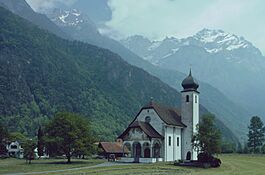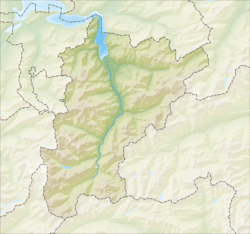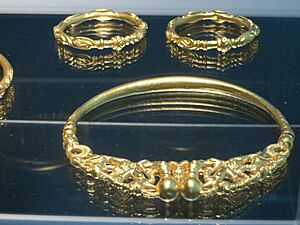Erstfeld facts for kids
Quick facts for kids
Erstfeld
|
||
|---|---|---|
 |
||
|
||
| Country | Switzerland | |
| Canton | Uri | |
| District | n.a. | |
| Area | ||
| • Total | 59.09 km2 (22.81 sq mi) | |
| Elevation | 475 m (1,558 ft) | |
| Population
(Dec 2020 )
|
||
| • Total | 3,861 | |
| • Density | 65.341/km2 (169.23/sq mi) | |
| Postal code |
6472
|
|
| Surrounded by | Attinghausen, Gurtnellen, Schattdorf, Silenen, Wassen | |
Erstfeld is a small town, also called a municipality, in the Uri region of Switzerland. It is located at the start of the northern part of the Gotthard railway, a very important train line.
Contents
History of Erstfeld
In 1962, something amazing was found near Erstfeld: four gold necklaces called torques and three gold arm rings! These beautiful items are very old, probably from around 400 BC. They were found buried under about 9 meters (30 feet) of dirt from a landslide.
The rings show special designs from Celtic art, which means they were made by ancient Celtic people. They are very skillfully crafted. No one knows exactly why they were buried. However, some people think they were gifts offered to the gods for safe journeys over the Alps mountains.
Erstfeld was first mentioned in old writings in 1258. Back then, it was called Ourzcvelt. Later, in 1638, it was known by its Latin name, in Protocampis. By 1831, people called it Hirschfelden.
Geography and Landscape
Erstfeld covers an area of about 59.2 square kilometers (22.9 square miles). A small part of this land, about 11.7%, is used for farming. Forests cover a larger part, about 29.2% of the area.
About 2.8% of Erstfeld is covered by buildings and roads. The biggest part, 56.2%, is made up of non-productive land. This includes rivers, glaciers, and mountains.
The town of Erstfeld is a linear village. This means it stretches out in a line along the valley. You can also find scattered farmhouses along the valley floor and up the mountain sides.
Erstfeld is very important for the Gotthard railway. It sits at the base of the northern part of this famous train line. The town also keeps all the trains and equipment needed for the railway.
Population and People
Erstfeld has a population of about 3,700 people. Around 13.3% of the people living here are from other countries. Over the last ten years, the number of people living in Erstfeld has gone down a little.
Most people in Erstfeld, about 88.7%, speak German. The second most common language is Serbo-Croatian, spoken by 3.7% of the people. Italian is the third most common language, spoken by 2.4%.
Many adults in Erstfeld have a good education. About 60.8% of people aged 25 to 64 have finished either high school or gone on to higher education, like university.
Erstfeld has a low unemployment rate, which means most people who want to work can find jobs. In 2005, many people worked in different areas:
- About 119 people worked in farming (primary sector).
- Around 643 people worked in factories and construction (secondary sector).
- About 870 people worked in services like shops, offices, and healthcare (tertiary sector).
Transportation
Erstfeld has its own train station, called Erstfeld station. This station is located right within the town. It is an important stop on the Gotthard railway line, connecting Erstfeld to other parts of Switzerland.
Famous People from Erstfeld
- Emilie Lieberherr (1924–2011): She was a very important person who worked for women's rights.
- Albert Eschenmoser (1925–2023): He was a famous scientist who studied organic chemistry.
See also
 In Spanish: Erstfeld para niños
In Spanish: Erstfeld para niños
 | Charles R. Drew |
 | Benjamin Banneker |
 | Jane C. Wright |
 | Roger Arliner Young |





